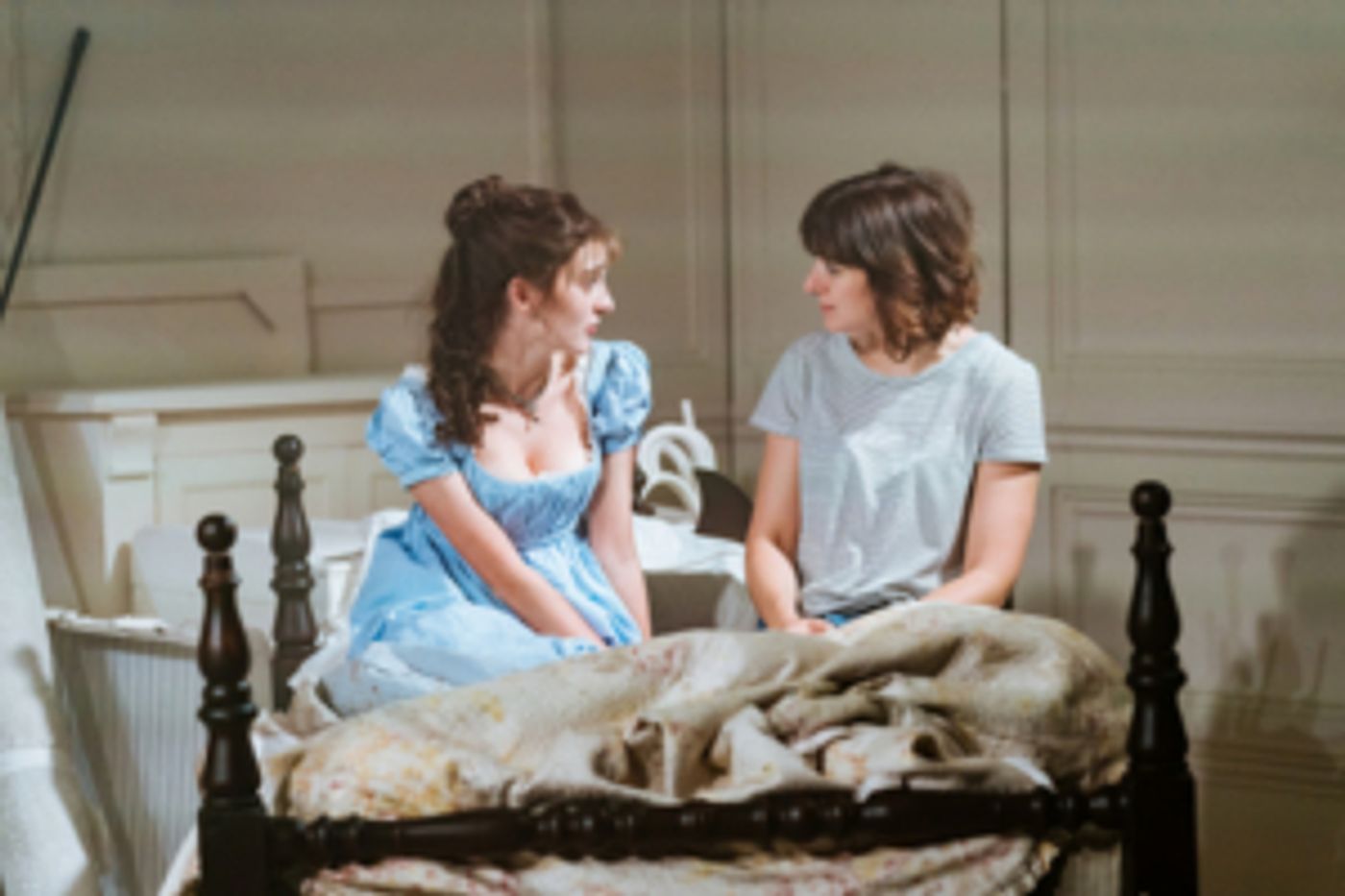Review: THE WATSONS, Menier Chocolate Factory

![]() Laura Wade isn't the first to tackle Jane Austen's unfinished novel, abandoned in 1805, but she is the only one so far to write herself, the struggling adaptor, into the text. This witty, ingenious and surprisingly philosophical play, which premiered at Chichester last year, merges Austen with Pirandello, and satire with big existential questions.
Laura Wade isn't the first to tackle Jane Austen's unfinished novel, abandoned in 1805, but she is the only one so far to write herself, the struggling adaptor, into the text. This witty, ingenious and surprisingly philosophical play, which premiered at Chichester last year, merges Austen with Pirandello, and satire with big existential questions.
We begin in familiar territory, all the author's usual tropes present and correct. Her spirited heroine is Emma Watson, who was raised by a wealthy aunt, but, when the aunt remarried, summarily returned to her estranged family in Surrey. Now, her only hope of escape from trying relations and genteel poverty is through matrimony.
Various romantic prospects include the socially awkward Lord Osborne, charming flirt Tom Musgrave, earnest clergyman Mr Howard, and dashing officers from the visiting regiment. But, in the midst of a surprise proposal from one of them, "Laura" intervenes, explaining to Emma that she is actually a character created by Austen, and this is where the novelist left off her story.
This leads to searching questions about a higher authority, self-determination versus destiny, and how an ideal society should be run (yes, we do get Brexit gags here). Laura - presumably also Wade - shares some of her creative struggle and writerly insecurities, as we see the idea of characters taking on a life of their own literalised in a fascinating way.
This also parallels with Austen's own process, as Laura and Emma play detective: why did she stop writing The Watsons, and can we trust her sister Cassandra's account of how the story would have ended? One poignant theory is that it was too close to Austen's own life - featuring, as it does, a dying rector father, and a woman struggling with a proposal from an aristocrat that makes practical, but not romantic, sense.
There are times when the drama is in danger of disappearing altogether into a metaphysical black hole, but Wade anchors it by using these grand musings to support Austen's own concern with agency: in particular, women's limited choices. We see that primarily with Emma's growing fury, but also through supporting characters voicing their own sense of entrapment - from grand Lady Osborne through to loyal servant Nanny. Wade's play gives us a quick indulgence in bonnets and balls, then shows the uncomfortable reality.
It's also wickedly funny. The collective gasp as Laura steps out of the Watsons' living room, exposing it as a set, is hilarious, as is the inevitable culture clash between Austen's characters and a 21st-century playwright with (gasp again) children out of wedlock. Plus there's loving send-up of luvvie types, from "I don't think my character would do that" to the secondary players demanding more material.
Samuel West's fleet-footed production beautifully handles both the Austen opening - efficiently introducing everyone and transitioning smoothly from a domestic setting to a ball (lively music by Isobel Waller-Bridge and movement by Mike Ashcroft) - and the subsequent zany anarchy. Ben Stones' set is key to the latter, its Regency trappings giving way to postmodern inventiveness.
The performances are uniformly excellent. Grace Molony unleashes the full force of a resourceful Austen protagonist given freedom to really rebel, creating a fractious dynamic with Louise Ford's increasingly panicked Laura - who tries to make the argument that Austen's heroines marrying for love is a feminist act, at least within those social confinements.
There are great turns by Joe Bannister as the endearingly inept Osborne, Paksie Vernon's self-sacrificing older sister and caretaker, Sophie Duval's snobbish sister-in-law from (a regular laugh line) Croydon, Jane Booker's imperious Lady Osborne, Sally Bankes' implacable Nanny, Tim Delap's well-meaning clergyman, Rhianna McGreevy's marriage-fixated Margaret, and Laurence Ubong Williams' Musgrave delighting in his role as cad.
This may not be one for those dedicated to the traditional Austen experience - though the opening scenes demonstrate Wade and West's terrific ability to dramatise her work - but, even when the meta really kicks in, there's still a clear connection to the author's intelligence, humour, keen observation and sly subversiveness. Evident, too, is the vital female perspective - and how storytelling is itself an escape, opening up myriad worlds and endless possibilities.
The Watsons at Menier Chocolate Factory until 16 November
Read our interview with Grace Molony
Photo credit: Manuel Harlan
Reader Reviews
Videos

